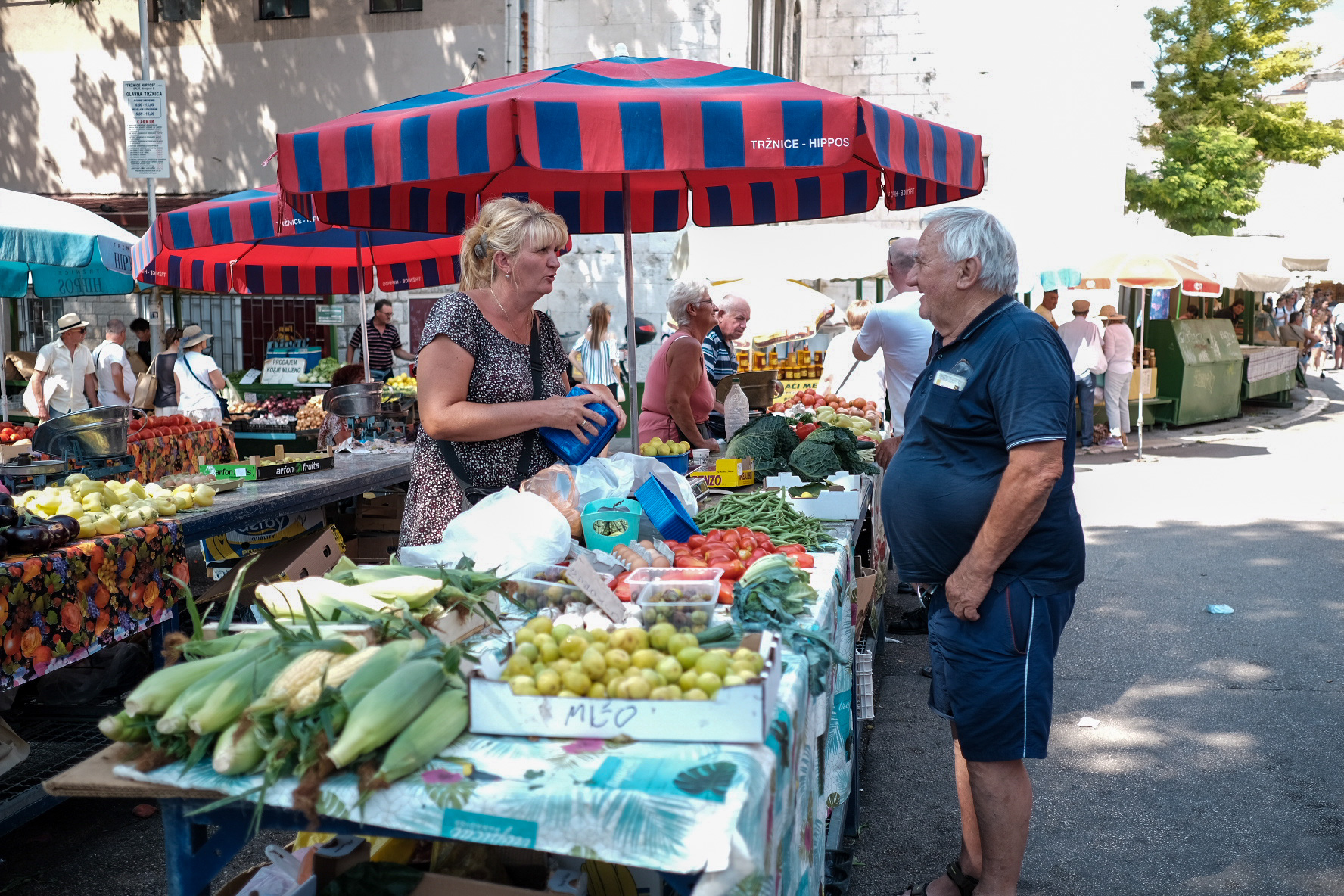PM Expects Report From All Relevant Services On Violent Pushbacks of Migrants
ZAGREB, 7 Oct 2021 - Prime Minister Andrej Plenković said on Thursday he had talked with Interior Minister Davor Božinović about violent pushbacks of migrants from the Croatian border with Bosnia and Herzegovina and expected a report from all relevant services to see what had actually happened.
"Last night I immediately called Minister Božinović to ensure that the Ministry and police take all the necessary measures and investigate the matter so that we see what happened and take appropriate decisions, because Croatia, as a country governed by the rule of law, respects its own laws and international rules. We do not want any actions that might be connected with the state and that are not in accordance with our legal system," Plenković said at a cabinet meeting.
"We have a duty to protect our border and prevent illegal migration. We appreciate the role of the Croatian police in protecting the border in the last few years after our continent has become a destination for migrations, which are often illegal and led and organized by smugglers who benefit from the misfortunes of many people who for various reasons left their homes," he added.
Likewise, We Can! party on Thursday described the treatment of migrants as shown by footage of violence on the border as unacceptable, calling on the police management to leave border protection to somebody else if they were not up to the task.
Footage of masked police beating migrants at the border. (Telegram.hr)
The latest footage of violence against refugees and migrants on our borders reveals serious problems in the way the Ministry of the Interior is dealing with the challenges of migration, the opposition party said in a Facebook post, thus joining in numerous reactions to videos showing the brutal beating of migrants on the border between Croatia and Bosnia and Herzegovina.
"If the current police leadership is not up to the task, it is time other people assumed the responsibility of protecting the border. The current approach to migrations is unacceptable and we once again support all police employees who do not agree with it and who have been warning about it for some time," the party said, recalling that it had warned on a number of occasions that the border can be protected without the use of violence and violation of human rights.
"The latest footage proves that we either have organized groups of thugs who beat refugees or police who remove their insignia and use force and beatings to drive people out of Croatia. Either means a defeat of the idea of a law-based state and human rights protection."
Božinović either denying the problem or announcing probes without an epilogue
The party went on to say that the Minister of the Interior Davor Božinović was "either denying the problem or announcing investigations without an epilogue."
It called on the minister and the prime minister to clearly say what was going on, who was responsible, and why they had not prevented the criminal activity on the border.
Minister Božinović said earlier today that an investigation had been launched to establish if the footage broadcast was authentic, noting that there was no tolerance to violence in the police.
Asked by reporters if he, too, was responsible if it turned out that the footage was authentic, Božinović said, "Why should I be personally responsible?"
He added that nobody had been given an order to use force, except in cases defined by the law, and that most situations on the border did not warrant such conduct.
For more about politics in Croatia, follow TCN's dedicated page.
Minister Says Vaccination of Health Workers Stepped Up
ZAGREB, 7 Oct 2021 - Health Minister Vili Beroš said at a government session on Thursday that the vaccination of medical staff against COVID-19 had been stepped up and that the current rate was 74%, with the highest increase in vaccination having been reported among nurses.
"Compared to a week ago, the share of unvaccinated staff has dropped by 2.4% and most of the newly vaccinated are nurses and other medical staff, which is an increase of 2.8%," Beroš said.
He commended medical institutions for the good organization of the introduction of COVID-19 certificates in the healthcare sector. So far 11,567 employees have been tested, 41 have been found to be positive for coronavirus, and 36 have refused to get tested, he said.
"By doing so we are not violating anyone's rights, quite the contrary. It is our duty to secure conditions for the safe treatment of every patient," said the minister.
Beroš said that his ministry had formed a commission to monitor the treatment of cancer patients in order to respond to the challenges of the post-COVID period as well as a task force to formulate amendments to the health insurance and health care laws to define new solutions regarding the availability of health care.
Speaking of the national day against breast cancer, the minister said that prevention programs had continued during the pandemic, albeit with a 10% drop.
He noted that Croatia had seen a drop in breast cancer cases of some 25% for the fifth consecutive year.
Irena Petrijevčanin, State Secretary at the Ministry of the Interior, said that the EU digital certificate based on a rapid antigen test was valid for 48 hours, one based on a PCR test for 72 hours, a certificate proving one's recovery from COVID-19 was valid for 180 days and one proving vaccination 365 days.
For more about politics in Croatia, follow TCN's dedicated page.
For all you need to know about coronavirus specific to Croatia, make sure to bookmark our dedicated COVID-19 section and select your preferred language.
Spanish PM Pedro Sanchez Visits Croatia: Strong Cooperation in 2022
October 7, 2021 - Spanish PM Pedro Sanchez visited Croatia recently and met with Croatian PM Andrej Plenković to talk about deepening diplomatic relations in 2022.
Nobody can deny the fact that foreign countries' ambassadors and diplomats are valuable in the day-to-day business of nurturing diplomatic relations with Croatia on various levels (political, cultural, economic, and more). But it's even more special when political representatives of other countries actually come to Croatia for an official visit.
The latest such instance was the visit of Spanish PM Pedro Sanchez. His meeting with the Croatian PM Andrej Plenković was the big story in the Croatian media space. Apart from foreign politicians' visitors generally being interesting, this was also the first visit of any Spanish PM, making the story all the more interesting.
As stated by the official governmental website, the two PM's talked about upgrading diplomatic relations between Croatia and Spain and the continuing intense political dialogue next week down in Dubrovnik at the European Future Conference (one such conference was recently held in Osijek).
PM Plenković pointed out the fact that Croatia recently joined the MED 9 Forum which involves nine Mediterranian countries, including Spain.
''The forum will serve as a dialogue for Mediterranean countries for upgrading their cooperation in a series of areas, particularly in terms of key global questions we're faced with. From the fight against illegal immigration, climate change, which is particularly important for all Mediterranean countries, to a series of security and developing topics important for North Africa and the Eastern Mediterranean,'' said Plenković.
Spain and Croatia enjoy mutual trade worth one billion euros, but the goal is, of course, to increase that figure.
Both countries are tourism-oriented, with the Spanish capital of Madrid also being the headquarters of the World Tourism Organisation, and instead of looking at each other as competitors for global tourists, the two leaders agreed to collaborate and enhance the offers of both of their countries.
Spain will also be the host of a top NATO meeting in 2022. With Croatia being a very enthusiastic NATO member, the Croatian governmental website states this is another reason Croatia wants closer relations with Spain.
To make sure not everything is just trade, tourism, politics and the military, there's good progress in terms of science too, in particular, the environment.
''One of the projects that is very important for reducing greenhouse gasses is the DONES project. It is Croatian-Spanish partner cooperation in which the Croatian side brings experts from the Ruđer Bošković Institute. It is a very important strategic project for nuclear fusion financed by the European Union funds. Experts will work on upgrading research so we can have a future of infinite clean energy sources,'' promises the governmental website.
This meeting was initiated by Plenković and he invited Sanchez, but the wish for cooperation is mutual.
''Spain wants closer cooperation with Croatia,'' said Spanish PM Sanchez, adding he expects to see Plenković in Madrid next year.
Did you know our TC guide is available in Spanish? Disfruta leyendo!
For more about Croatian-Spanish relations, follow TCN's dedicated page.
Arhibau Fair About Culture of Building, Sustainable Development Starts in Zagreb
ZAGREB, 7 Oct 2021 - The Arhibau fair, dedicated to the culture of building and sustainable development and showing the best Croatia has to offer in construction and architecture, was opened on Thursday.
The topic of the fair, open until the 9th, is "Future after the crisis based on the New European Bauhaus initiative".
The event was opened by Prime Minister Andrej Plenković, who said it was a place where one could see the things kick-starting development processes in this decade, which he said would be a crucial decade for Croatia's development.
As a stakeholder in the Paris climate agreement, Croatia is committed to global sustainable development goals, first of all in order to contribute to the fight against climate change and its economic and social effects, he said.
"We realize that, in line with our possibilities, we must go towards a more sustainable model of economic development, while efficiently utilizing all our natural resources and seeing to it that not one of our citizens is left out of that process."
Plenković said the EU and Croatia were looking for their opportunity in the green and digital transformation of economies and societies. "Throughout history, Europe has always been one of the leaders of economic development and standards, first of all in arts, architecture, urban development, design."
He said that since 2019 Europe had been aware of the moment and needs to transform for the better so as to maintain a high level of development as well as grow further, but not at the expense of the environment and living space.
"That process is long and comprehensive. The New European Bauhaus is also an important topic, launched this year as an ecological, economic and cultural project that will lead to a common conceiving of more attractive and more sustainable projects," Plenković said, adding that the three fundamental values of the New European Bauhaus were sustainability, esthetics and decision making.
The European Green Deal covers all sectors of the economy, so a large chunk of money from the NextGenerationEU instrument will be set aside for it, he said. Commission President Ursula von der Leyen has announced €85 million for the New European Bauhaus.
"It will be interesting to see how we can include the National Recovery and Resilience Plan into what the New European Bauhaus represents today," Plenković said.
Zagreb Mayor Tomislav Tomašević said the city administration's goal was to develop new tools and mechanisms for the sustainable use of the city's spaces, to upgrade physical plans with European guidelines, and to establish control mechanisms that would prevent what he called fragmented urbanism without public interest.
The focus will also be on transforming and activating abandoned and unused city properties to create good and sustainable spaces, on decongesting traffic, new mobility, the affirmation of healthy mobility, and on designating new spaces for pedestrians, Tomašević said.
Culture Minister Nina Obuljen Koržinek said the conference on the New European Bauhaus accompanying the fair was right on time, ahead of post-earthquake reconstruction and the implementation of all projects from the National Recovery and Resilience Plan that promote a Europe not dependent on fossil fuels by 2050.
For more, make sure to check out our lifestyle section.
ECDC COVID Map: Zagreb Remains Dark Red, Other Parts of Croatia Red
ZAGREB, 7 Oct 2021 - The Croatian capital city of Zagreb remained dark red, while the rest of the country was red on the new epidemiological map of the European Centre for Disease Prevention and Control (ECDC), issued on Thursday.
Zagreb turned dark red last Thursday.
Slovenia, Estonia, and Lithuania are dark red completely, while the most favorable epidemiological situation considering the COVID-19 incidence rates is in the Czech Republic and Poland this week.
The color red means a 14-day incidence of 75-200 cases of the infection with coronavirus per 100,000 inhabitants, with the share of positive cases exceeding 4%, and an area where the 14-day incidence is 200-500, while dark red is used to identify areas where the 14-day incidence exceeds 500.
The ECDC map is of a consultative character and some EU countries rely on it when imposing epidemiological restrictions for returning travelers.
For coronavirus resources specific to Croatia, including info on travel and the locations of vaccination points and testing centers, make sure to bookmark our dedicated section and select your preferred language.
9 Countries at 2021 Olive Picking World Championship on Brac, & Digital Nomads!
October 7, 2021 - The 2021 Olive Picking World Championship kicks off this week in Postira on Brac, with the usual strong international lineup, and a new kid on the block - Team Digital Nomads.
With the main tourist season coming to a close, the thoughts of most Dalmatians turn to the fields, and their precious olive groves.
But for one small part of the island of Brac, a unique idea back in 2017 combined tourism with the traditional olive harvest.
Postira launched the Olive Picking World Championship four years ago, an event which has grown in stature (and international appeal) since its inception. After becoming a casualty of the pandemic last year, the 4th edition of the Olive Picking World Championship will take place this week, from October 8-10, in th fields of Postira.
And it has become a truly international event, with olive picking techniques from as far away as New Zealand taking part in the past.
Defending champions Montenegro have withdrawn at a late stage sadly, but there is still a high quality international flavour to this year's competition. Each team consists of four pickers, two male and two female, and there is a new kind of team this year to compete with the other 9 registered nationalities - Team Digital Nomad.

1. Poland
2. Hungary
3. Slovenia
4. France
5. South Africa
6. Russia
7. Slovenia
8. Israel
9. Digital nomads
10. Croatia.
The team of four ar all participants in the award-winning Dubrovnik Digital Nomads-in-Residence progamme earlier this year.
The DN team has an international quality, with the quartet of former Dubrovnik nomads-in-residence hailing from Wales, Holland, USA and England, with a coach from Australia.
The coaching started earlier this week in Montenegro at the Cross Border Coworking Conference in Budva, where olive-picking techniques while holding a beer will bring a fresh perspective to the 2021 Postira championships (see video below).
A great event, one more small example of great authentic experiences outside the season.
You can follow progress on the Postira Tourist Board Facebook page, and TCN will bring you an in-depth report on this year's olive champion.
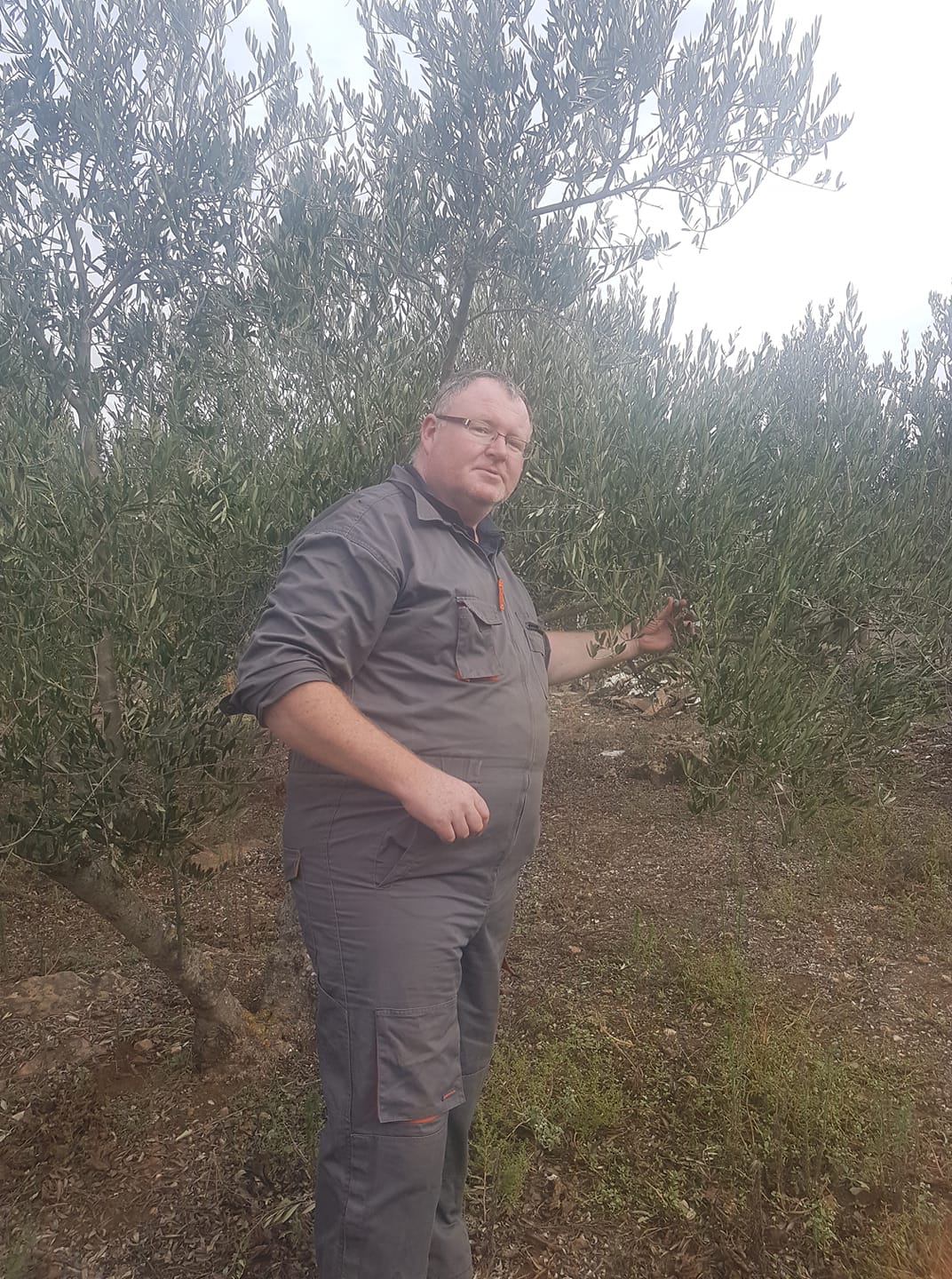
Never experienced an olive harvest? After 18 years as a Dalmatian 'zet' (son-in-law), it has become part of my DNA - learn more in Natural Stress Relief: the Olive Harvest in Dalmatia.
Want to learn more about olive oil in Croatia? Check out the TC olive oil guide.
Taste the Mediterranean: Split Festival Officially Commences
October 7, 2021 - The 4-day International Food Festival Taste the Mediterranean officially kicked off last night and was attended by many prominent personalities including Oscar-winning Bosnian director Danis Tanović, Split Mayor Ivica Puljak, screenwriter/director Nikola Kuprešanin and top chefs from 8 Mediterranean countries!
Despite heavy rain, the opening of the TTM Festival was a huge success. The famous Split fish market was almost unrecognisable as chef Zlatko Marinović and his excellent team from the restaurant Noštromo magically transformed the usually sooty place to a sophisticated dinner venue. The participants and invited guests were greeted with welcome drinks featuring The Botanist's handcrafted vermouth and crisp sparkling wine with a generous selection of decadent amuse bouche featuring Adriatic oysters and sea eggs.
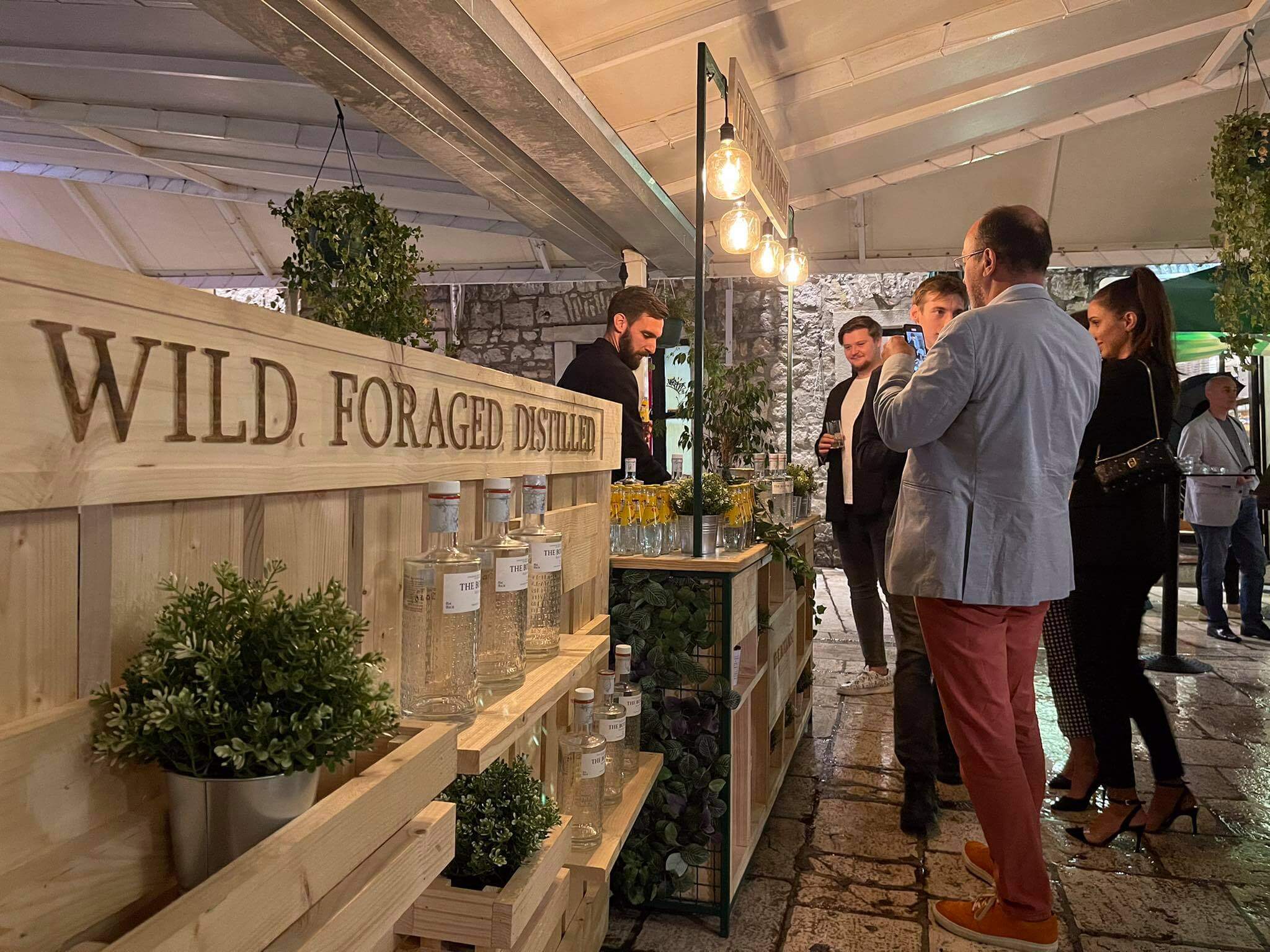
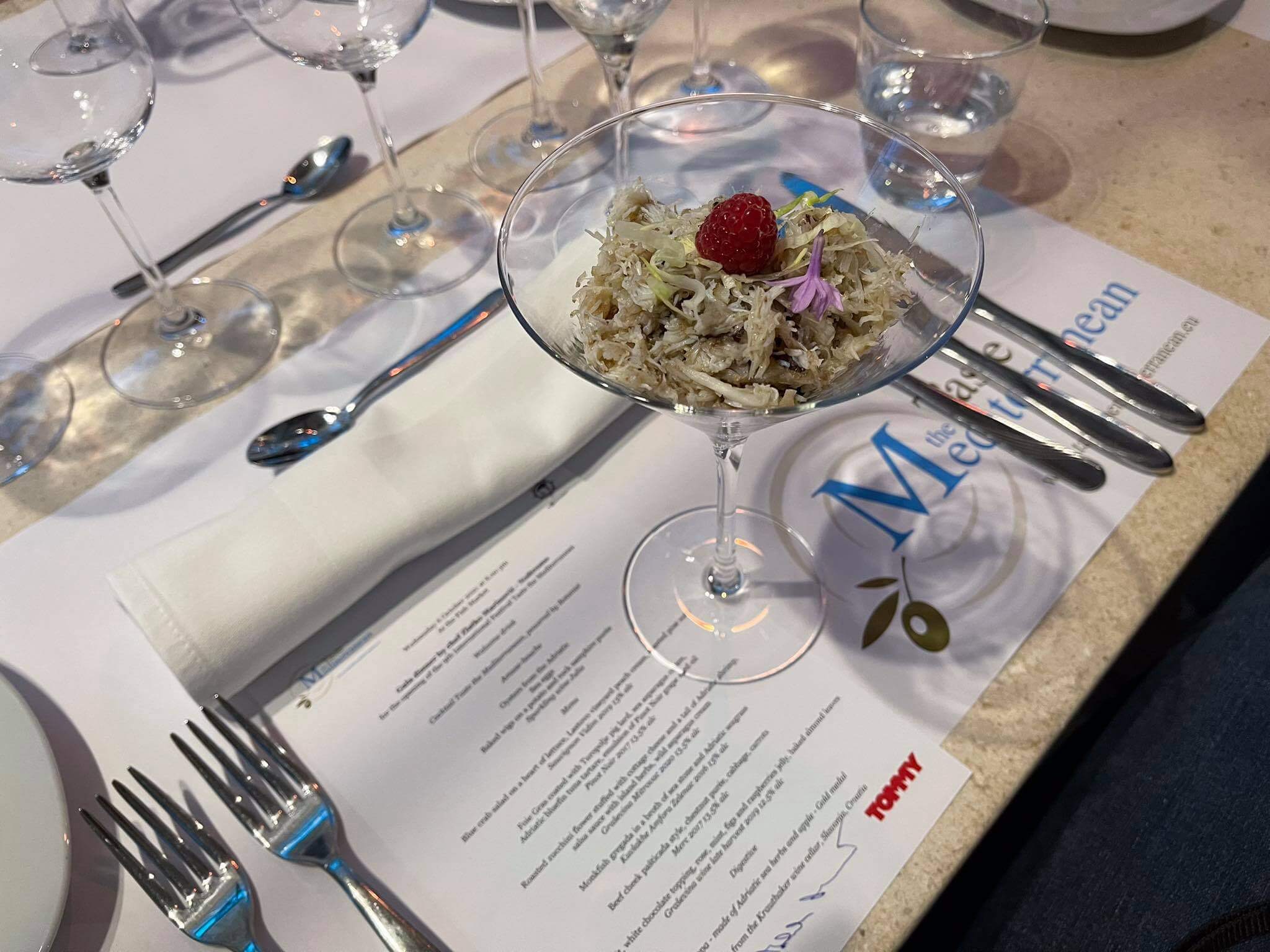 Photography: Princess Prkić
Photography: Princess Prkić
The dinner gala began by introducing the participating chefs together with Split Mayor Ivica Puljak. The invited chefs are from Croatia, Spain, France and other Mediterranean countries whose restaurants have been awarded with Michelin stars, recommendations, and Gault & Millau toques. These chefs will also grace the festival with their cooking, masterclasses, and special panel discussions. Afterwards, the participants and guests were treated with a special 6-course menu prepared by Chef Marinović and paired with carefully selected wines from the Krauthaker wine cellar in Slavonia. The dinner ended with a serving of Adria grappa, a special grappa made of Adriatic sea herbs and apple.
The festival will run until Saturday and will hold many events such as Spanish and Italian wine tasting, exclusive dinners in various Split restaurants, cooking masterclasses for professionals and culinary students, and special workshops and panels at Briig Boutique Hotel in Bačvice. You may find out more details on the festival here.
The coming days in Split will be filled with gastronomic delights as 15 restaurants chose to participate in the first Split Restaurant Nights, a part of the Taste the Mediterranean Festival, in which the participating restaurants will offer 3-course meals and wines at a promotional price from October 8 to October 9 to locals and tourists. The participating restaurants include Atlantida, Bajamonti, Brasserie on 7, Bokeria, Corto Maltese, Dujkin Dvor, Fantažija, Konoba Fetivi, Konoba Marul, Mazgoon, Laganini, Pandora Greenbox, Portofino, Sidi bar and Šug. To find out more on Split Restaurant Nights' exclusive and special offers, CLICK HERE.
For more about Taste the Mediterranean Festival, CLICK HERE.
For more on lifestyle, follow TCN's dedicated page.
For more about Croatia, CLICK HERE.
Croatian Diaspora in South America: Two Years in Hindsight
October 7, 2021 - Today is two years since I arrived in Croatia, without imagining that it would be my new home. In the latest article of the Croatian Diaspora in South America series, I share ten reasons why I think Croatia is an ideal and easy to adapt destination for those coming from South America.
On a day like today, but two years ago, I landed in Zagreb without knowing that Croatia would be the country where I would stay to live, leaving behind twenty-four years of invaluable experiences, moments, lessons, and friendships made in my country, Peru. Now I am 26 and living in Podstrana, 20 minutes south of Split. It has been two years of ups and downs, marked mainly by a current pandemic. I've learned a new language, lived in three cities, made new friends, met valuable people, found a job, been close to my family, and much more.
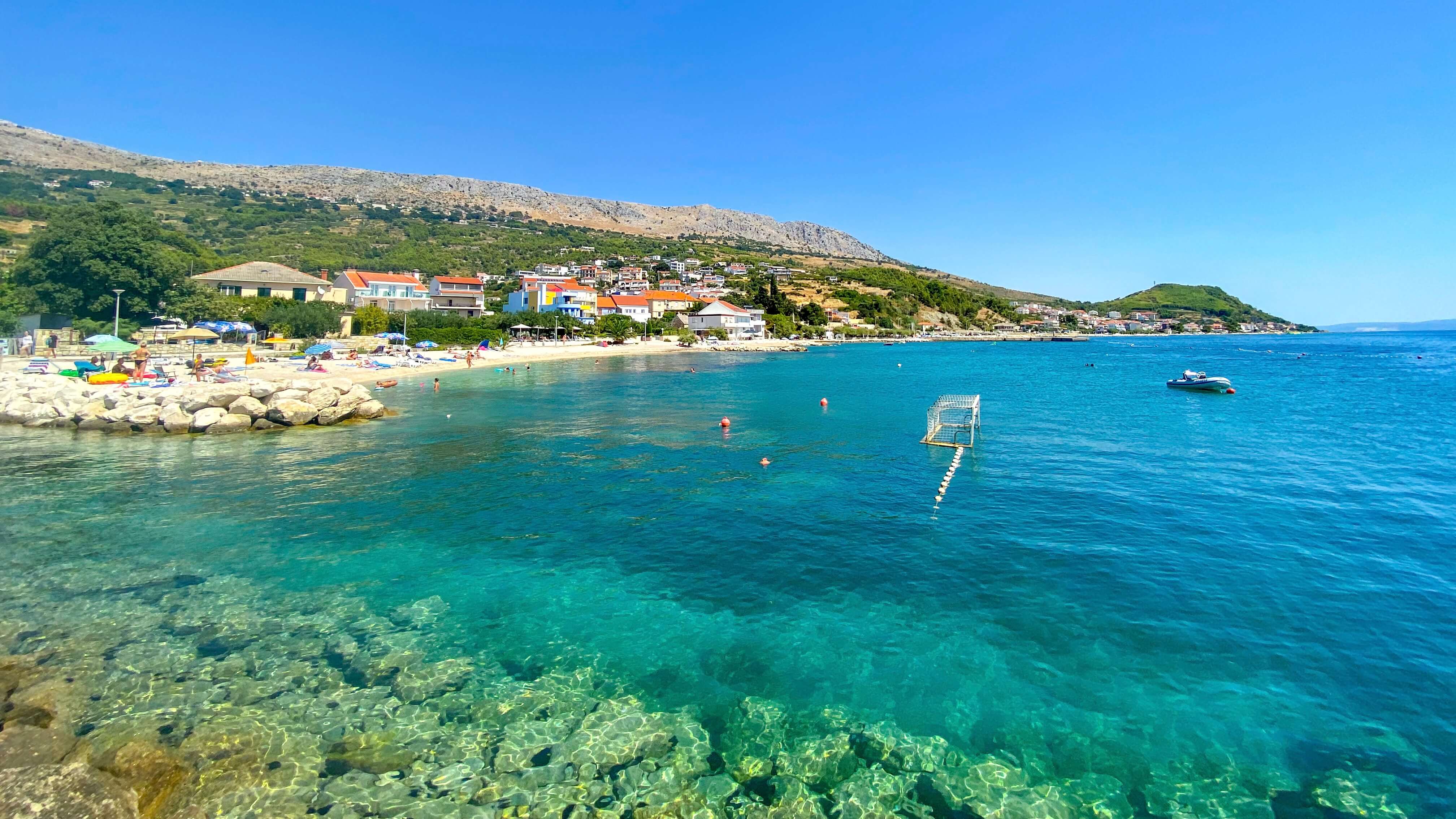
Podstrana, 20 minutes south of Split, where I currently live with my family. (Photo: Jose Alfonso Cussianovich)
Leaving your country is always a difficult decision. There are several reasons that can push one to do so, but emigrating means leaving behind important parts of your life such as your family, friends, customs, places, food, traditions, etc. And all these things have a very important meaning for those who emigrate from South America. I know of many people who made the decision to try their luck here in Croatia, whether it was to enjoy its natural beauty or to reconnect with their Croatian ancestry, and for many reasons, it didn't work out in the end. I don't mean to say this as a letdown, but it is true that for many it might be a bit hard to adjust their lives here.
Sometimes we do not find that compatibility between the place where we come from and the place where we have just arrived. But for whatever reason, it occurs to me that for all of us who come from South America, there are still many reasons why we could feel inspired to at least give it a try. And it is worth mentioning that I have met people from Argentina, Bolivia, Chile, and Colombia, and I think many could agree with me. And even if you don’t plan to stay longer, you will surely find your days in Croatia very pleasant and enjoyable.
There will always be thousands of reasons not to do something, but after living two years in Croatia, here are ten reasons why I think it is an ideal and easy to adapt country for all those who come from South America:
1. Country life and city life go hand in hand
As much as I wanted to, I have not been able to travel to all the countries of the world. However, one thing I have noticed in those I have been to is that city and country life are separated in many ways. I have seen that the urban lifestyle and modernity are very present in many European cities. But to find the simplicity of the countryside (if any), you have to drive an hour or even more to the outskirts of these cosmopolitan cities.
Although the phenomenon of Westernization has been transforming the capitals of South American countries progressively in the last century, the presence of the countryside will always be felt, and this is evident every day in the markets or even on the streets. Personally, I believe that my city, Lima, wasn’t any different from Zagreb, Rijeka, or Split in that sense.
Pazar, the market outside Diocletian's Palace to buy local products in Split. (Photo: Jose Alfonso Cussianovich)
I have noticed in Croatia that although in Zagreb, Split or Rijeka one can really feel like in a European city, rural life is not something distant for its inhabitants. It really doesn’t matter whether you work as a business person in the financial district, or if you work in the field outside of the city. Chances are that both people will cross their paths anywhere they go and none will look the other over their shoulders.
2. Politics and public sector
Not necessarily a good reason, but it definitely builds our tolerance for a change of scenery. When I began to meet other Croats, they questioned me (amicably) for leaving a corrupt country to arrive in another one. I did not want to expand on the subject, and justly demonstrate that the political or social situation in South America is totally different. I come from a country with as much or even more bureaucracy, but I think that precisely that has helped me to be tolerant and very patient when going to the MUP or the HZZO for any paperwork.
Of course, if you come from a country like Singapore, Lithuania, Finland, or New Zealand, having to go to any tax administration office here would be the closest thing to a horror story. But for us, South Americans, coping with long queues, grumpy employees, half-baked information, or being told to come back next week, is an everyday thing. My advice? Take a deep breath before entering the building of a public institution, and be friendly with everyone you interact with inside. You will see that it is easier for them to streamline processes with people who treat them with cordiality.
As for the political situation, well, it is not my intention to trivialize what is happening here. I am aware that Croatia is not a country free from political tensions or corruption. After all, and despite the great development that has been taking place after the war, it is still a young country with a lot of room for improvement.
However, and that is why I say that it is not my intention to trivialize what is happening in Croatia, what is happening in South America is serious. The Croatian diaspora is found mainly in countries such as Argentina, Bolivia, Peru, Chile, Venezuela, or Colombia. In recent years, the social, political, and economic situation in these countries has reached critical moments: coups, police repression, disappearances, famines, mass migration, inflation, and more, unfortunately.
It is true that the idea of arriving in a country as safe and beautiful as Croatia is more than enough reason to buy tickets, pack our things, and try our luck there. But it is important to recognize that, in many cases, motivation may revolve more around the concept of survival. To travel so far and leave everything behind, maybe it can mean that no matter what happens elsewhere, it can't be worse than where you came from.
And this goes both for young people who seek to grow professionally in a better environment and for those who have already spent enough years of instability in their countries and are looking for some peace to retire.
3. Gastronomy
This has to be one of the most important points, and one that I have been analyzing more over time. Food is VERY important when it comes to changing countries. And there are so many experiences: what you find in the market, the homemade recipes, what you see on the menu of a restaurant, what you find open at midnight, what they serve you at your partner's house, the typical food in a town, etc.
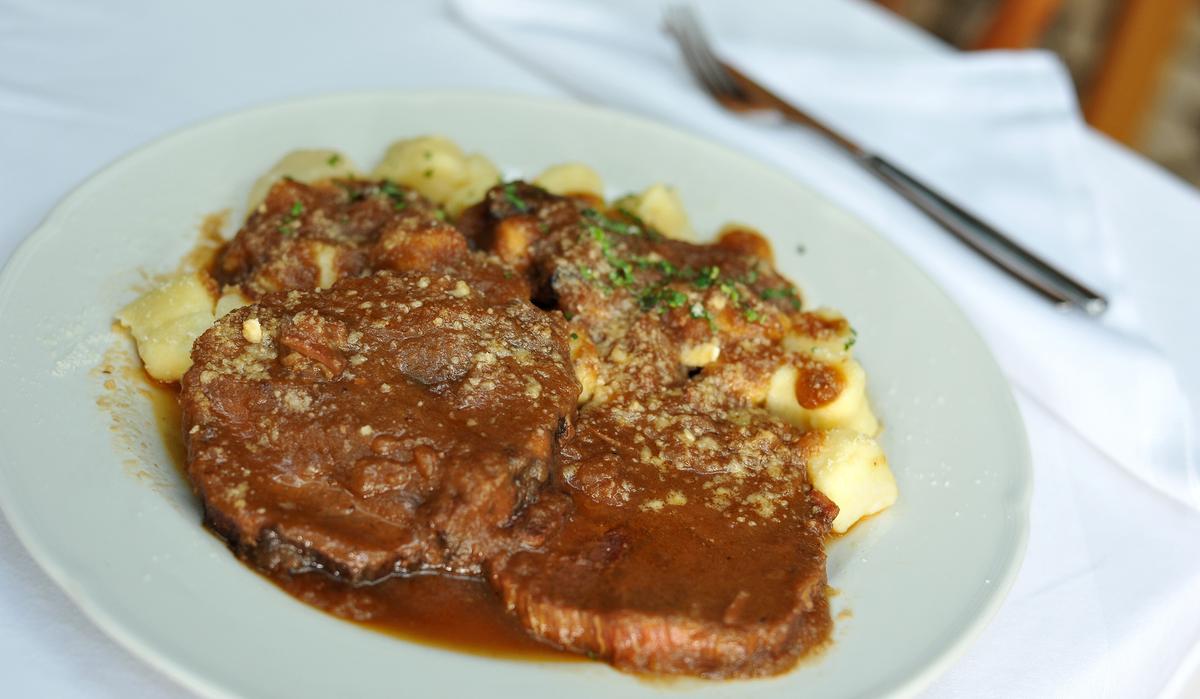
The pašticada is, without a doubt, one of my favorite dishes. (Photo: Nina Djurdjevic/PIXSELL)
In this sense, I think there is an interesting link between item one on this list and the one you are reading right now. Somehow, I know that there is food that can be considered a luxury, and I know of luxuries that will always be within your reach. In Peru, for example, food is a luxury. And not because of the price, but because of the quality. And the best of all is that you can find these luxuries on your table and at almost zero cost. And I believe something similar happens in Croatia. The best Croatian food can be found when you are invited to eat at your friend's house or in inexpensive restaurants.
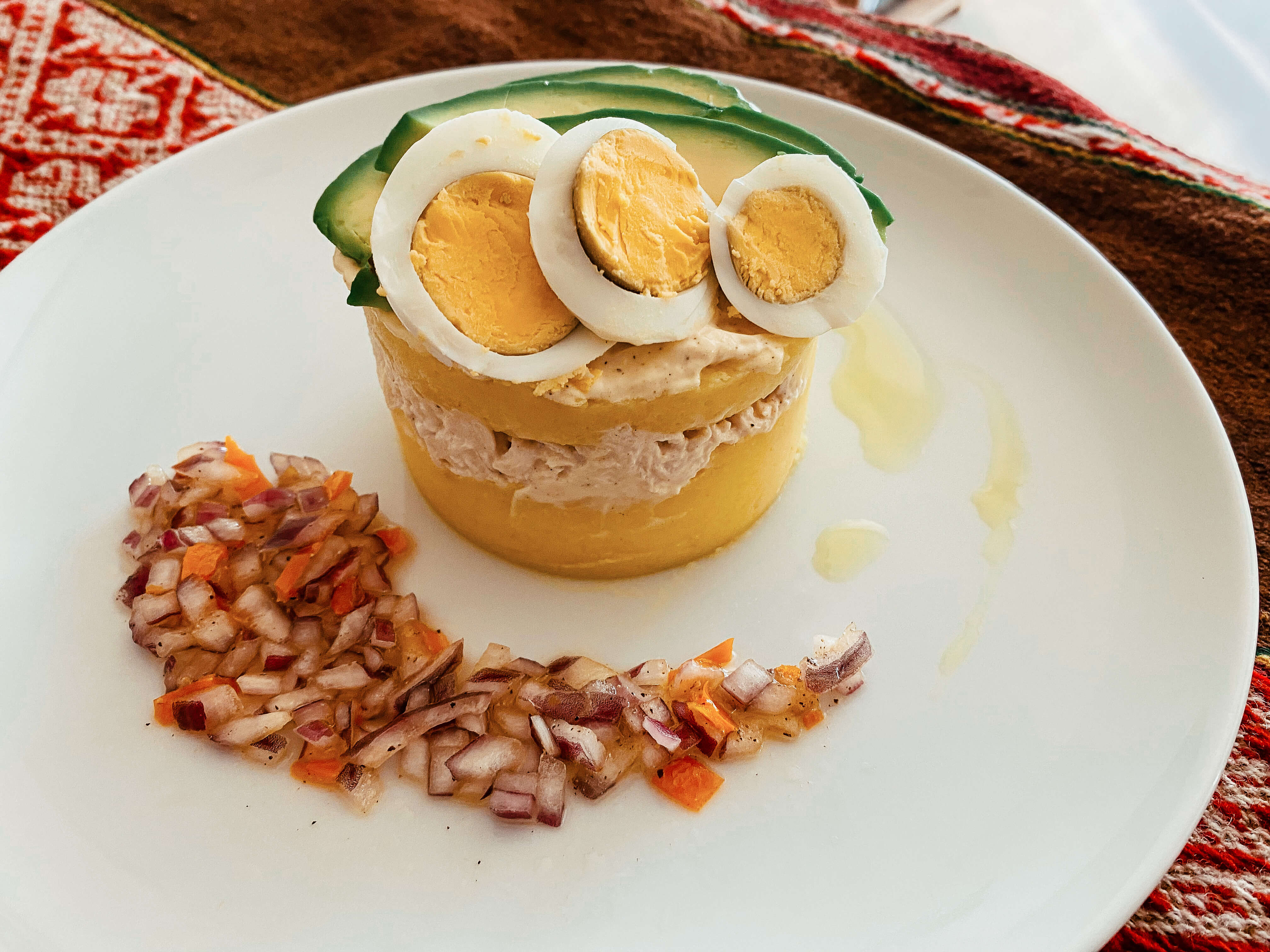
The ''causa rellena'', one of the emblematic dishes of Peruvian gastronomy. Never in my life would I have imagined eating it in Croatia. Prepared by my father at home, with a mixture of ingredients bought here in Split (potatoes and lemons), as well as others from Peru that were bought online (yellow pepper). Nothing is impossible! (Photo: Jose Alfonso Cussianovich)
It is important that a country that boasts culinary diversity and typical gastronomy is accessible to all. I like living in a country where dishes have stories and family recipes go back to very ancient times. When I arrived in Croatia I asked myself, what now? What will I eat? Not only have I found a country that has very good ingredients in its markets to try to prepare dishes from my own country, but that the food here is so good that it will easily take away your nostalgia.
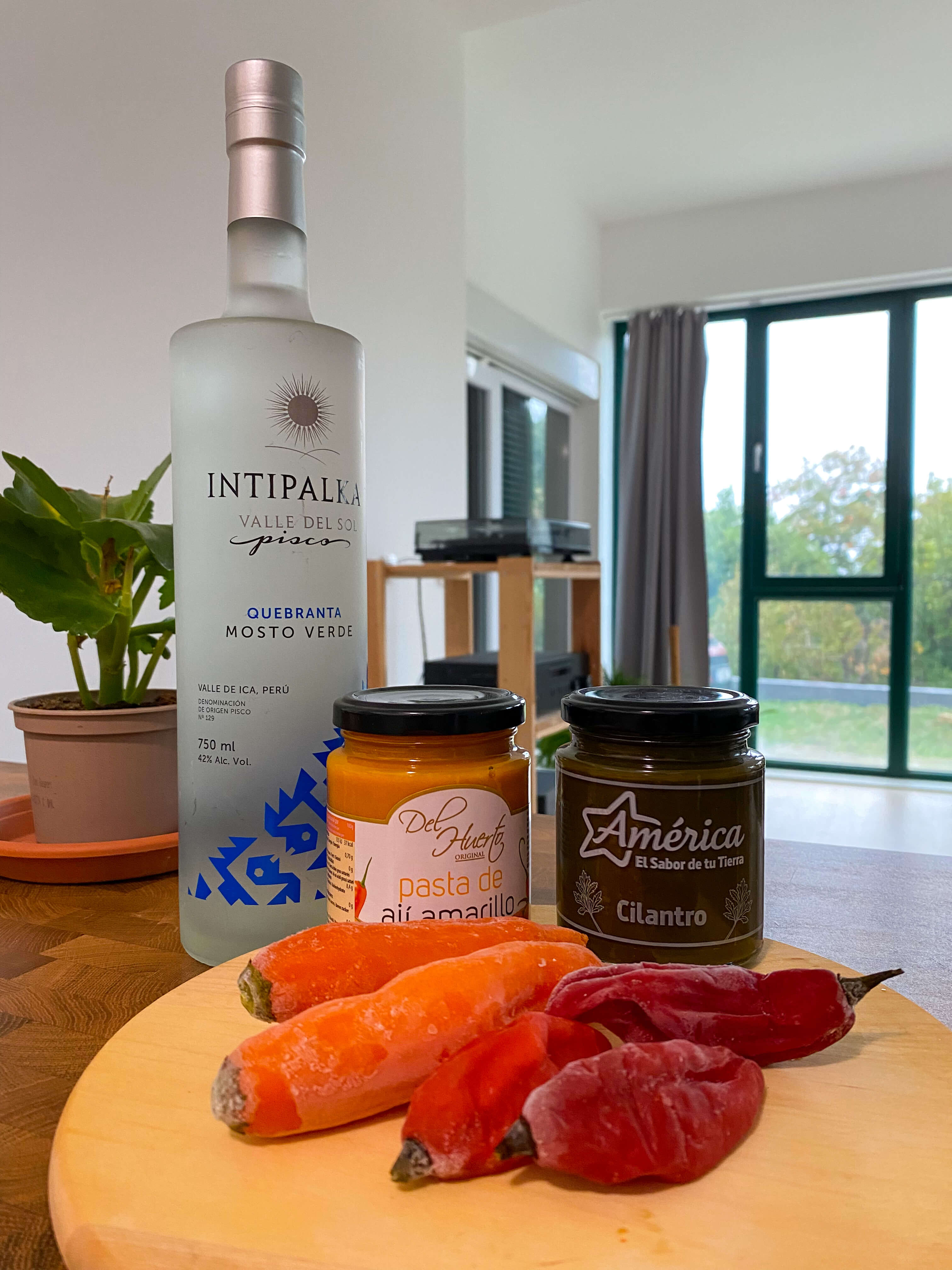
Out beloved Pisco, yellow pepper, limo pepper, cilantro... just some of the products that help the Peruvian palate not to be homesick. (Photo: Jose Alfonso Cussianovich)
And do not worry, if we have learned something here, it is that you can order many culinary products from Latin America online, and they arrive at your home in a few days and at a great price. In addition, there will always be the possibility that you convince your family and friends to visit you and bring you something typical of your country, such as liquors or sweets for your nostalgic palate.
4. Folklore and Traditions
Among the things where I find the most similarities between the cultures in the countries of South America with Croatia, I believe that the affection and respect for the ancient traditions, customs, and folklore of our peoples and countries is something that we undoubtedly share.
From a very young age, they taught us at home and in schools about typical dances, costumes, celebrations, dishes, music and on what dates they were especially important. There are even national folklore competitions, and I've always been pleased to know that people of all ages participate in them. This paragraph may well have been written as the testimony of a Croatian by birth as well as a South American.
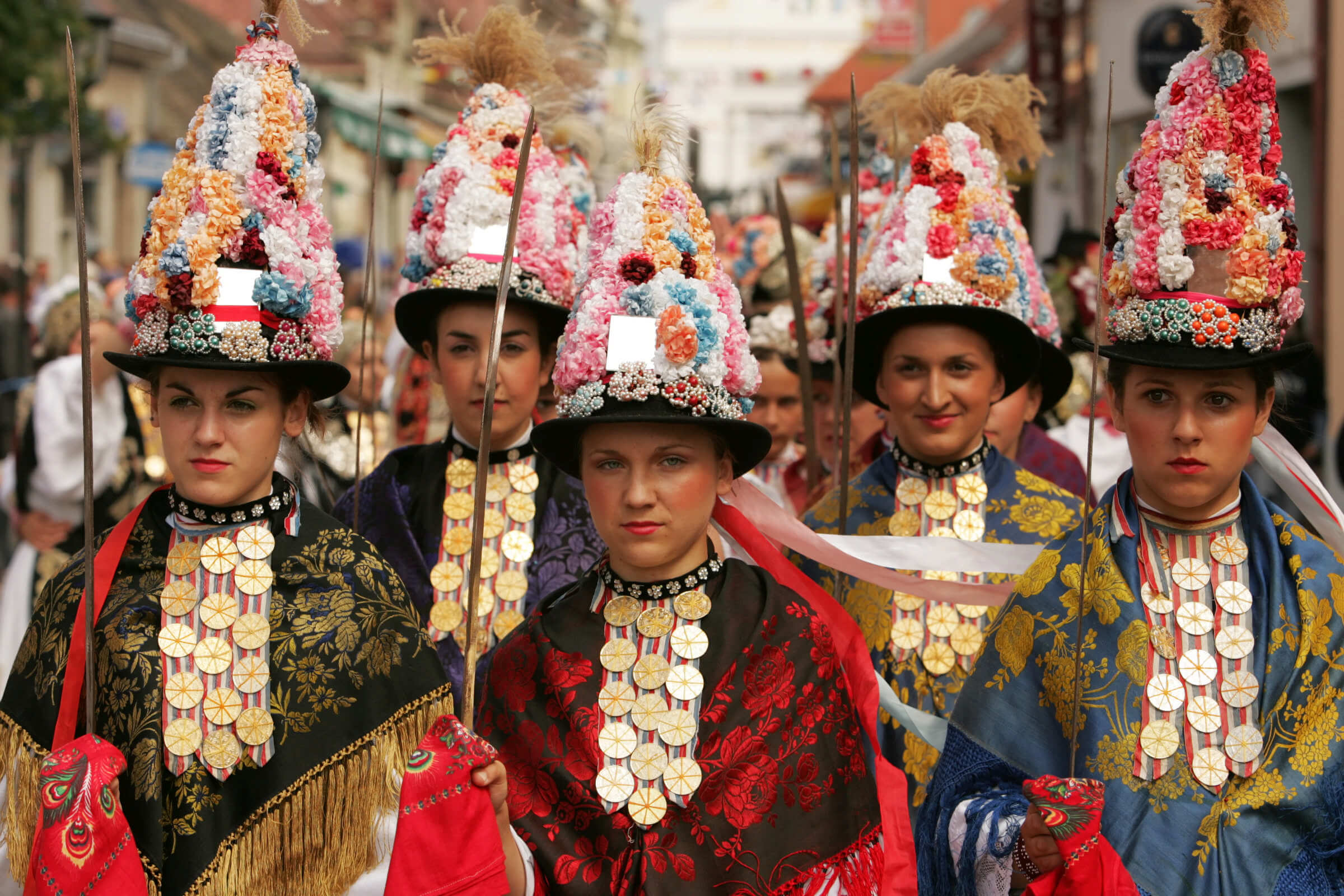
Slavonian girls and their typical costumes. (Photo: Mario Romulić)
I encourage you to drive or travel through Croatian territory, be it in Dalmatia, Istria, or Slavonia, to any small town and you will find a population with a lot of roots and whose identity is reflected in a large and diverse number of customs and distinctive elements.
Unlike other European countries, I have noticed that the presence of local customs and traditions is in basically all regions of the country. If you were born in the capital and surrounded by buildings and modernity, it is still very difficult that you might not have some kind of connection with this folklore, and that is something that happens in both Lima and Zagreb.
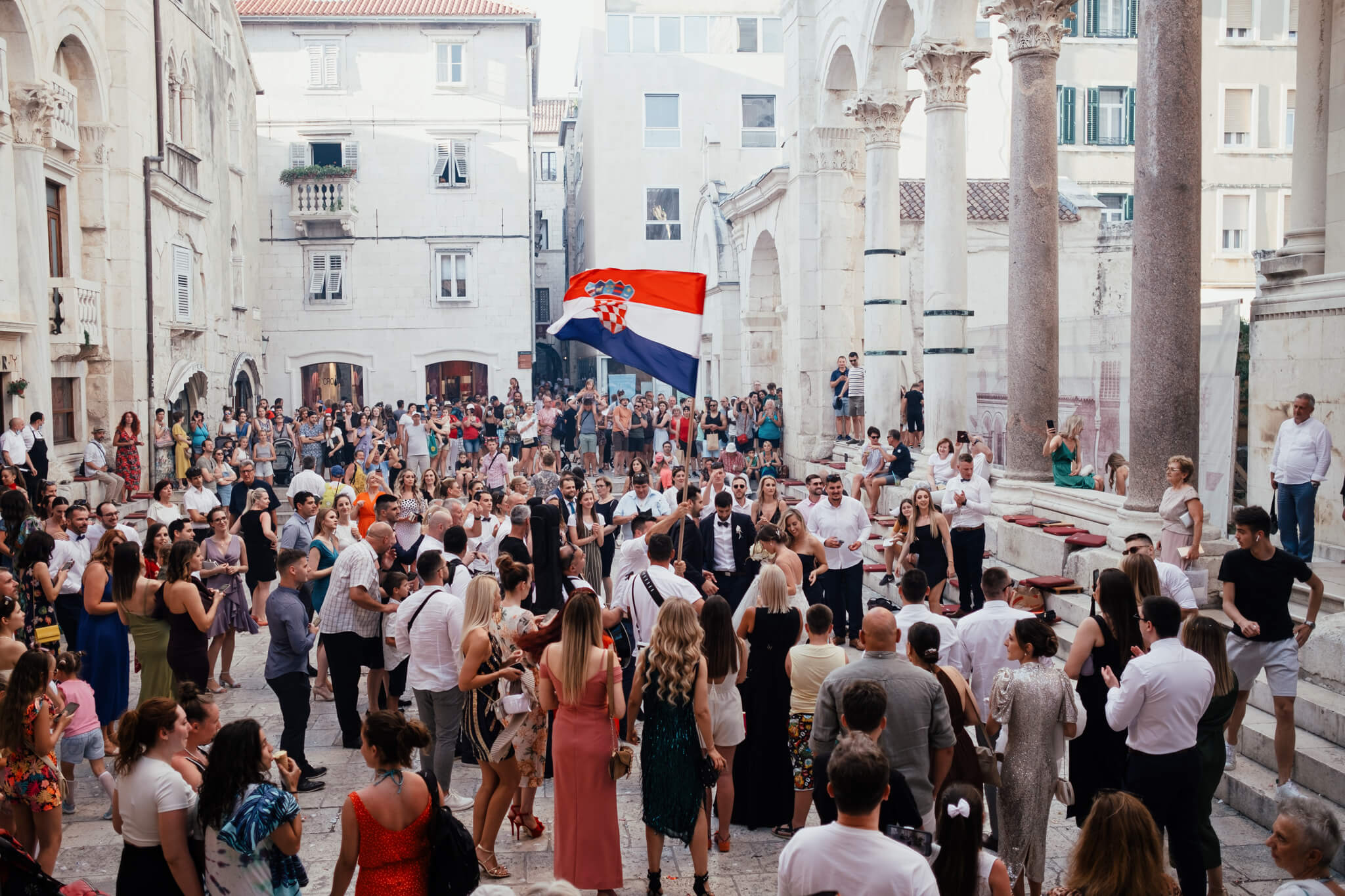
Celebration of a wedding at Diocletian's Palace, in Split. (Photo: Jose Alfonso Cussianovich)
On the other hand, being South America a continent with a very strong Catholic identity, you will find a country that boasts beautiful cathedrals, churches everywhere, impressive religious festivals, an internationally recognized devotion, and even an official miracle!
5. Weather
I can't imagine myself living in a country or city with hellish temperatures during the summer or some freezing temperatures during the winter. Yes, it is VERY hot on the Croatian coast between June and August, and I can confirm this after an almost unbearable heatwave during the summer. But it is definitely manageable. Why? Well... BEACHES!

A beach just 5 minutes from my house, in Sv. Martin, Podstrana (Photo: Jose Alfonso Cussianovich)
Many countries in the world can boast of having beaches to which their inhabitants can flee when the temperature rises, but definitely, both in South America and in Croatia, it is not so much a solution but rather a lifestyle. And if it is not the sea, it may well be a visit to a lake or river. In any case, those of us who come from the southern hemisphere know how to counteract the heat, whether on the coast or in the jungle.
I cannot deny, however, that in my two years living in Croatia I have not been somewhat intimidated by the cold. Although it is nothing compared to the situation in Scandinavian countries, Russia, the United States, or others, you should never forget a good coat and gloves. It may be that those from Argentina, Chile, Bolivia, or the Peruvian highlands feel somewhat more familiar with subzero temperatures, but those who in some of their worst winters registered 17 degrees (like me), we will surely find in the heating systems and thick sheets a few friends.
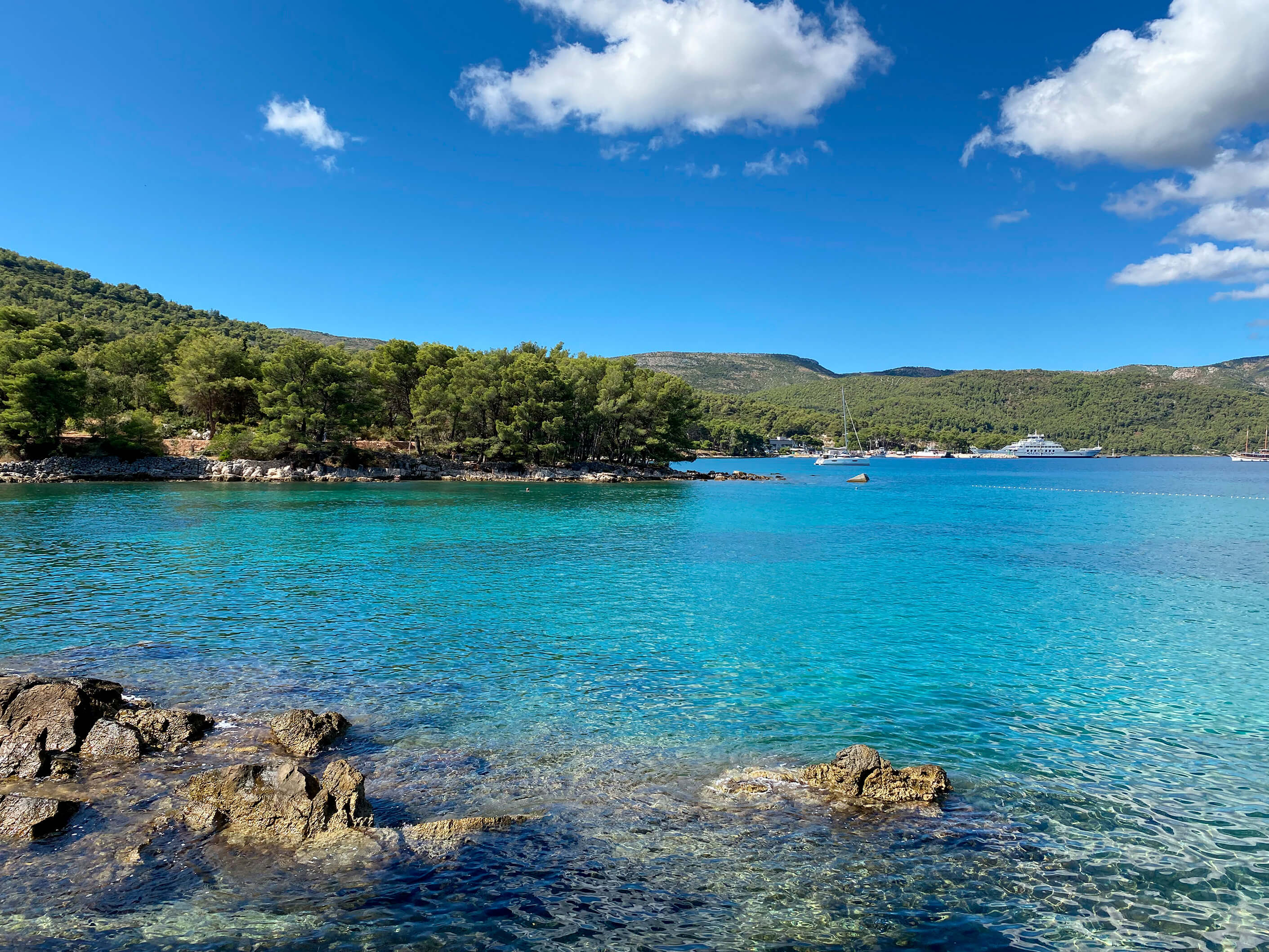
Arguably my favorite place in Croatia, the town of Stari Grad on the Island of Hvar. This is Lanterna Beach, between the town and the ferry port. (Photo: Jose Alfonso Cussianovich)
If I'm sure of one thing, it is that Croatia is a country where we can have a good time 365 days a year, and not only because it can withstand high or low temperatures, but because each season offers a huge variety of activities and events. Argentines and Chileans, for example, will find it very pleasant to be able to ski and snowboard in Sljeme (Zagreb) or Platak (Primorje-Gorski Kotar) during winter.
6. Sports
Despite the enormous fanaticism I have for football, and knowing how spectacular the experience was during the 2018 World Cup in Russia, I must admit that Croatia is much more than football. Water polo, wrestling, athletics, handball, basketball, tennis, judo, tae kwon do, rowing, sailing... is there anything they can't do? Croatia has returned from Tokyo 2020 with 8 Olympic medals, and even with tennis doubles final where the gold and silver medals were contested only between Croats.
I see Croats rowing on Lake Jarun in Zagreb, practicing water polo on the beaches of Omiš, or sailing in the waters of Split, and many practices it from a very young age. It is clear to me that sport in Croatia is already part of the local culture. And the best of all is that the sport is not only for those who practice it but also for those who are in the stands. The fervor of the Croatian spectators is second to none. Whatever sport it is, in any competition, Croats live it to the fullest. It happens that in many countries, one or two sports are the favorites and the rest are only for a niche audience. However, here in Croatia, it is a responsibility to support all your athletes in any discipline. The best part is seeing the streets and squares lined with red and white checkered T-shirts and flags, thunderous chants everywhere, and plenty of beer. No matter the outcome, sporting events in Croatia are always a reason for parties and celebrations.
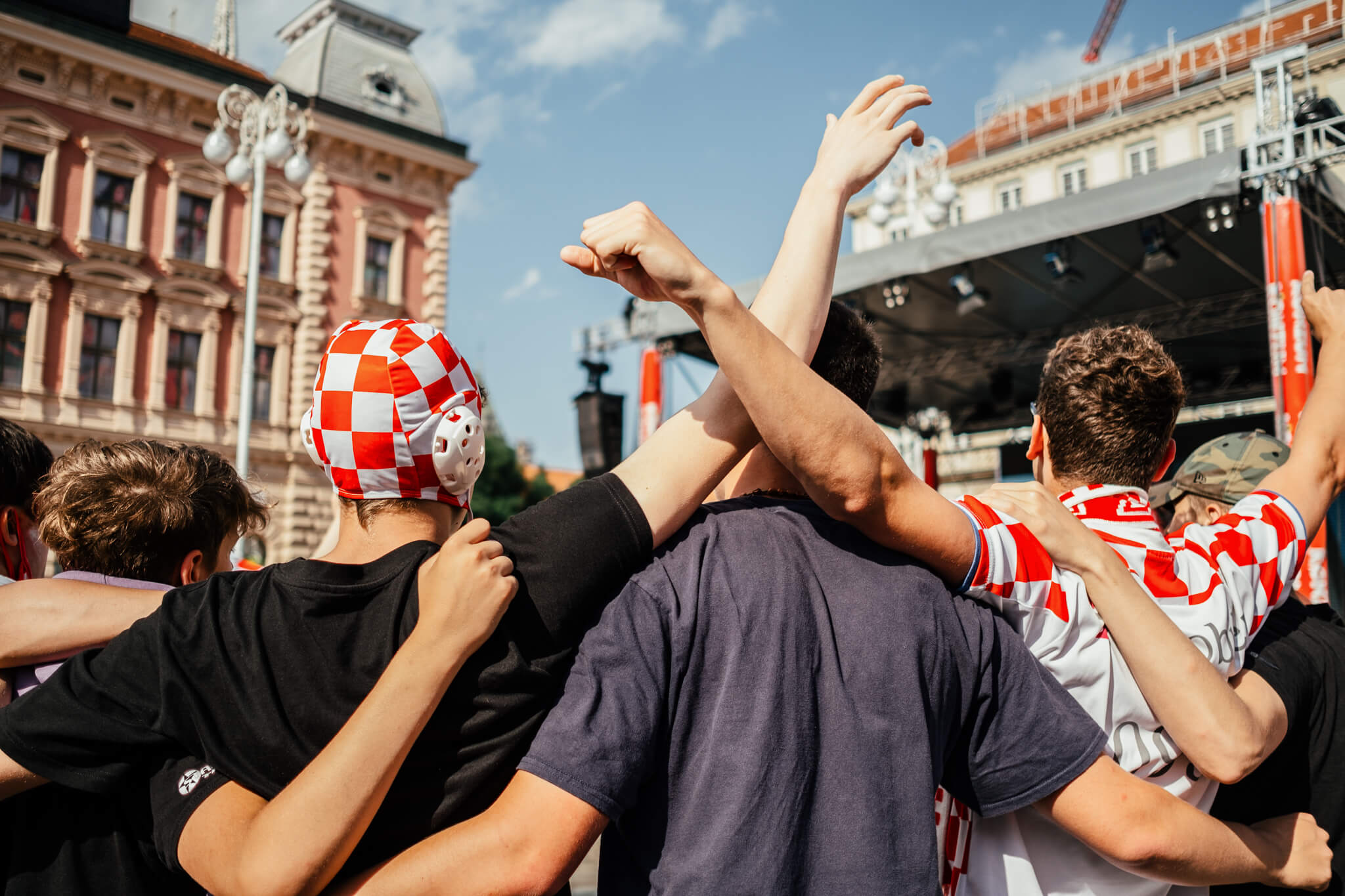
Supporters of the national team in the latest edition of the EURO tournament gathered in Ban Jelačić square, Zagreb. (Photo: Jose Alfonso Cussianovich)
And in addition to classic sports, Croatia is an ideal destination for all those in love with extreme and adventure sports, and I know there are many of them in South America. The geography of the countries that share the Andes mountain range allows its millions of inhabitants to enjoy numerous sports such as hiking, mountaineering, skiing, snowboarding, cycling, among others. If you are one of those who lives and breathes adventure, Croatia has a lot to offer you.
7. The Diaspora and Croatian identity
As many must know, there is a large Croatian diaspora in South America, mainly due to migratory movements during the second half of the 19th century, and the first half of the 20th century. The countries with the highest number of Croatian descendants are by far Argentina and Chile. However, there are also a significant number of Croats in Peru, Venezuela, Bolivia, and Colombia. It is true that over time large groups of migrants have arrived from various origins, such as Italy, for example. However, I feel that there is something different with Croatian migrants.
There is no easy migration story. The simple fact of leaving your country, without a clear destination, is difficult to digest. As I read somewhere, no one leaves their country unless they feel threatened in theirs. However, who am I to judge someone’s reasons? It could be said that nowadays it is easier to leave the country for the simple fact of changing the scenery and experiencing what the rest of the world can offer us. But in the last 10 years, there are reasons in many nations to believe that there is no prospect of life on their own soil. It is neither more nor less than the turbulent reality of millions of Croatians who, more or less 100 years ago, decided to leave their properties and lands in a country as beautiful as theirs, for a totally unknown place.
And that's what intrigues me the most. Because somehow, some came to start from the bottom, and others came with small fortunes. And for all that time, to this day, they knew they had something in common after all: they had left the land where they grew up. So they stuck together, and that's how Croatian communities were formed in South American countries. Today, there is a huge Croatian community on the South American continent, in which members share their experiences and those of their ancestors, or help each other navigate through time and trace their origins.
In 2018, my father (on the right) was able to meet Dusko Kusijanović, our distant relative from Mokošica, in Dubrovnik. In the picture, they're both looking at the house where our ancestors grew up. (Photo: Patricia Medina, my mom)
My own experience returning to my ancestor's country has taught me that Croats greatly value transferring their pride in their country and its traditions to their descendants, and that is why so many young people born in the 21st century remain curious to venture out. in the country of their distant relatives.
I insist, I still have a lot to learn from the Croatian diaspora in South America, but I feel that although the migration took place to all corners of the planet such as the United States or Australia, the chaotic political and social events that have taken place in South America over the past century has motivated countless Croatian descendants to consider returning to their motherland. That is why, if today you seriously evaluate trying your luck in Croatia, it has a large community of Croatian-South Americans who are already making their living in Istria, Rijeka, Zagreb, Zadar, Osijek, Split, Dubrovnik, etc. They will not hesitate to give you a hand from the first day you land in Croatia, as did the Croats who arrived in Argentina, Chile, Peru, Venezuela, Bolivia, or Colombia a little more and less than a century ago.
8. Nationalism
Some will say that being a nationalist, especially in today's conjuncture, is nothing to celebrate or be proud of. Certainly, taking our nationalism to the extreme gets us nowhere but conflict. But keeping it present as part of our identity is not harmful, as long as we show the same respect for others’ identity.
There are many ways to express love towards our country. Appreciating our traditions, supporting sports teams, celebrating our gastronomy, singing our anthem at the top of our lungs, remembering our history... you name it.
The vast majority of countries extend this sentiment to their inhabitants from the time they are children, both at home and in schools. Although I have not spent enough time in other countries to analyze in-depth the type of nationalism they carry, I know that in almost all of them there are plenty of reasons to be proud of their roots and their land.
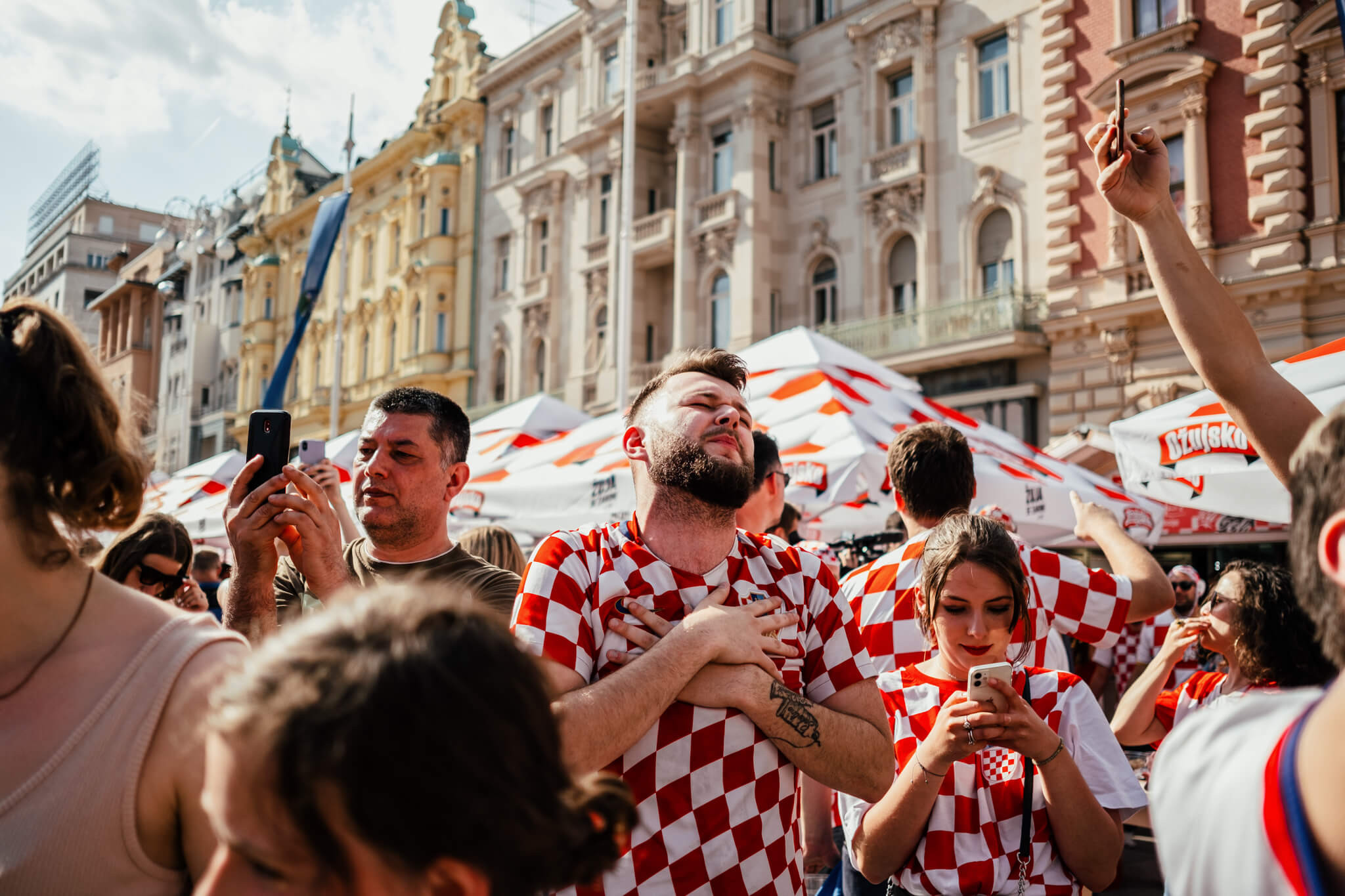
(Photo: Jose Alfonso Cussianovich)
I understand that while Croatia is a European country, and for many, it is considered a first-world or western country, its recent history proves to be problematic, hard, and of late development. Many nations can boast of retaining the same name or basically the same territory of several centuries ago, and whose governments consisted of transitions between monarchs or political parties. However, in the particular case of the South American countries and Croatia, achieving independence through wars was, unfortunately, the common outcome.
We will always come across people who will use their country and their pride to minimize the rest. There is no exception. However, I have the pleasure of living now in a country where I hear its inhabitants speak with as much pride about their country and its history as I would, as well as their eloquence when it comes to being critical of themselves when the situation requires it.
9. Latin culture in Croatia
This was definitely a surprise and a very welcomed one. Although I admit that I did not know a lot about Croatian society before arriving, never in my life would I have imagined that Croats have consumed enough of our culture, both when it comes to watching popular telenovelas or participating in salsa dancing lessons.
If you don't believe me, just tell a Croat that you come from a South American country and they will immediately tell you that they grew up watching the popular melodramatic series that were exported from our continent, and they will even dare to impress you with some phrases or words they learned in Spanish.
It has been a very positive experience to meet many Croats willing to learn more about my country and that of other colleagues of mine from South American countries. And I think that is why it is good to refer to the previous point, about nationalism, because you can put your country at the top, but it does not mean losing interest and respect for the rest of the world. I know, for example, the importance of rakija in Croatia, but with great pleasure, I have met Croatians who have tried the national drink of Peru: pisco. Rest assured that when you come to Croatia you will be welcomed with open arms.
10. Opportunities
I remember very well that in the weeks leading up to my trip to Croatia I always tried to clarify that it was not a whim or a luxury. For some, moving to Europe may just be a matter of changing their lifestyle, but the decision I made was extended to my entire family due to the fact that it was no longer financially viable to continue living in my country. The mission was clear: arrive and work hard.
Now, if it comes to work and study opportunities, many South Americans would opt for other destinations before Croatia, such as Spain, the United States, Portugal, Italy, Canada, or the Netherlands, to name a few. In a way, they are countries whose economic development goes hand in hand with a more established and long-lived system of work and opportunities.
But the interesting thing about Croatia is that it is a country that, although it has barely 30 years of independence (26 if the end of the war is considered as a peaceful beginning for its own development), has grown very quickly compared to the rest of the countries in the Balkans. And the growth continues each day. In just two years in Croatia, I have noticed that although there is great room for improvement in many aspects and sectors, it can be said that in other industries it can be a leader, such as tourism.
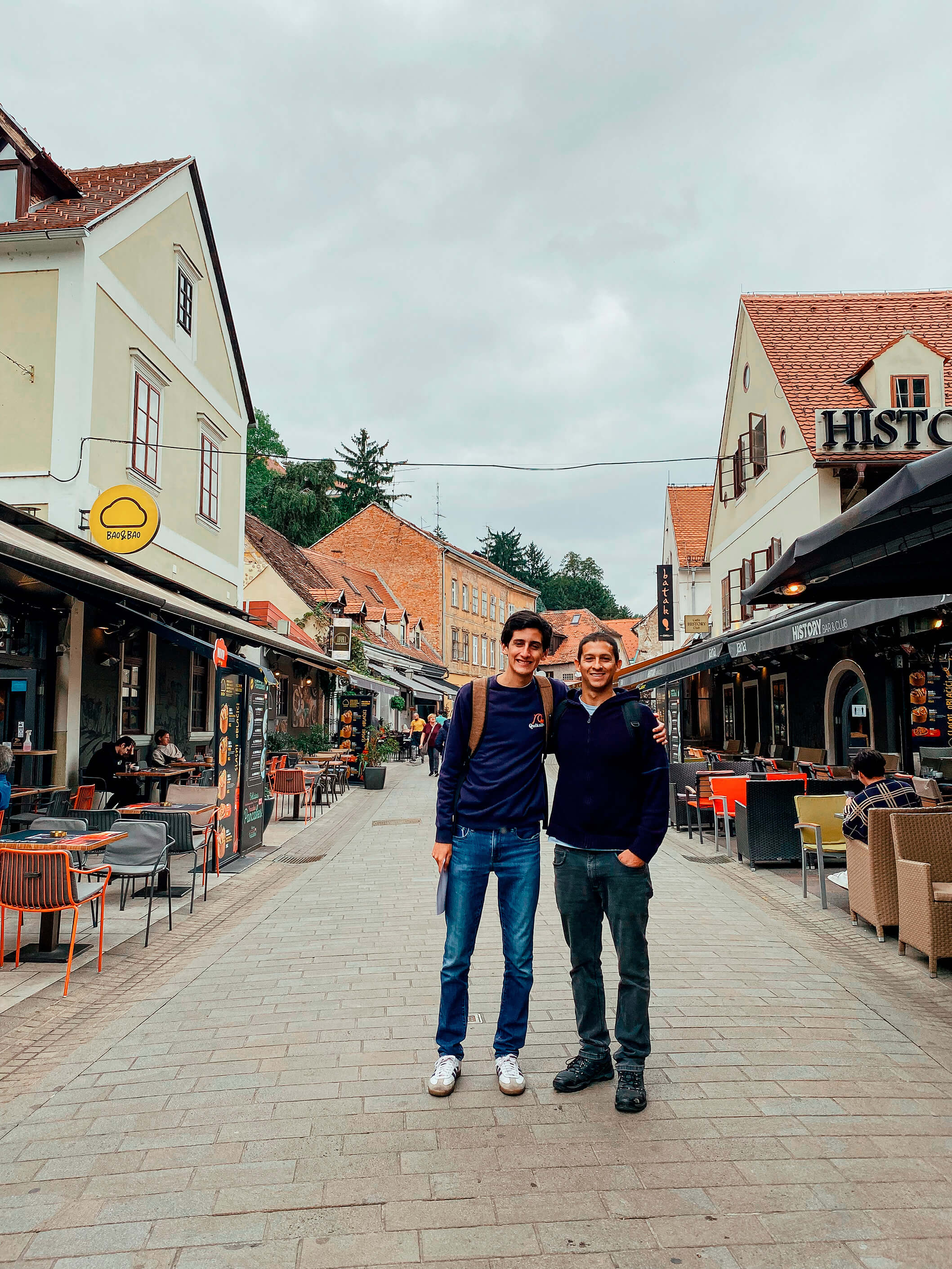
Two of my cousins: Julian Cussianovich (18) on the left, and José Salvador Palacios (39). Different generations, but they're both now in Zagreb, in a new chapter of their lives. (Photo: Jose Alfonso Cussianovich)
For young South Americans like me, who mostly have grown up with the very clear goal of working hard to get what they want, choosing Croatia as the next destination is definitely an attractive proposition. Not only will they arrive in a country where many universities and companies do very well with English, but where they will also find better working and living conditions, mainly due to the accessible health and safety system on the streets.
The best of all? There are many doors to open. It is a great opportunity for those who come to find their distant relatives, those who wish to study the Croatian language and culture through the program offered by the Central State Office for Croats outside the Republic of Croatia, those who wish to invest in land, property or in the tourist business, digital nomads who can now apply for a permit to work remotely in any city in Croatia... the opportunities are there, you just have to dare!
For more about the Croatian Diaspora, visit our dedicated page here.
Croatia Reports 1,748 New Coronavirus Cases, 8 Deaths
ZAGREB, 7 Oct 2021 - In the past 24 hours, 1,748 coronavirus cases and eight related deaths have been registered in Croatia, the national COVID-19 crisis management team said on Thursday.
There are 9,299 active cases, including 823 hospitalized patients, of whom 119 are on ventilators, while 16,379 persons are self-isolating.
Croatia has logged 413,665 coronavirus cases to date, 8,730 deaths, and 395,636 recoveries, including 1,254 in the past 24 hours.
Also, 2,885,071 persons have been tested for the virus, including 10,592 in the past 24 hours.
54% of adults vaccinated
To date, 45.39% of the population has been vaccinated against COVID, including 54.44% of adults, of whom 51.07% are fully vaccinated.
For all you need to know about coronavirus specific to Croatia, make sure to bookmark our dedicated COVID-19 section and select your preferred language.
Scientists Record Distressed Female Lošinj Dolphin Mourning Loss of Calf
October 7, 2021 - A female Lošinj dolphin mourning the loss of her offspring saw scientists visibly heartbroken and showed once again that animals have feelings which run just as deep as our own.
The clear and beautiful waters of the Croatian Adriatic bring a lot of joy and relaxation to people from all over the world, either by jumping and swimming in the soft waters in the hot summer months or by simply observing and breathing in the healthy air either from deck or land on less sunny days.
However, like any other place, the Adriatic can be a place of tragedy and sad scenes, whether for humans or animals that call this Mediterranean ''alley'' their home. The waters surrounding beautiful Lošinj island was sadly the location of a sad tale.
As was reported on Wednesday by Croatian RadioTelevision (HRT), the Blue World Institute from the small town of Veli Lošinj, recorded a female Lošinj dolphin mourning the tragicloss of her calf. The calf sadly died and the mother used her nose to keep the baby on the surface of the sea, swimming with the deceased calf for hours.
This recording of dolphins in the Croatian Adriatic acting this way showcased just how much love, empathy, and emotions they possess.
{youtube}v=iqMBU6ntHo4&t=83s/youtube}
''These are the first recorded cases even though the research here has been being conducted for over 35 years,'' said Tihana Vučur Blazinić from the Blue World Institute for HRT.
The touching scenes disrupted scientific procedures which decided to only record the incident and not take the calf's body to try to determine the precise cause of death of the unfortunate baby dolphin.
However, since they saw these touching scenes in person, it's hard to blame them for not removing the corpse from the female Lošinj dolphin who was visibly distressed, especially when other dolphins joined the mourning mother.
''At one moment, you had a feeling as they were swimming so close, as if to hug and comfort her, like they're supporting her in these difficult times. The mother, however, regardless of other adults animals approaching, didn't want to leave her baby,'' they told HRT from the Blue World Institute.
With the stork Klepetan mourning the death of his love Malena, the heart-breaking grief of this female Lošinj dolphin is proof that animals have very deep emotions and are much more like humans than we might think. These sad scenes offer another argument that should warn the public that the preservation of biodiversity is a must.
For more about animals in Croatia, follow TCN's dedicated page.


